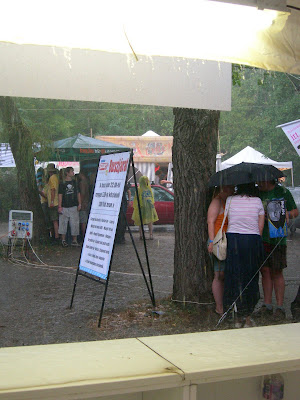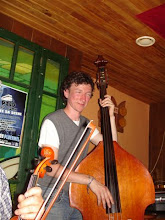



Our program has been the following, struggling to get free-time from 6p.m. to 1a.m. (which was damn lucky in the first place):
Thursday the 9th of August:
Besh o DromTinariwenCesaria Evora(all the following at the World Music stage)
Mike Stern Band(Jazz Stage)

Before mentioning the music, it's well worth mentioning the quality of selection I find in Sziget's organisation. The World Music category respects its wide and varied choice of 'popular roots music' - bands changing every year, whereas it isn't such an essentially open circuit by its 'popular' discourse, but they put a lot of effort in presenting good Hungarian Bands or creations around roots or what I generally prefer to refer to as traditional music.
Headliners change every year, and I think main voices of isolated cultures are heard in an open festival context which largely favors the music. I am thinking of
Tinariwen the voice of the Desert Nomads, or last year
Erik Marchand emerging from Breton-Bulgarian fusion, also
Marie Boine, who is extremely famous in Norway, but not necessarily in outside.
It's interesting to have this dialog between the genres - which is the whole interest of having those 'categories'. Sziget is such a rich place you'd want to go anywhere, I believe (or at least I'm optimistic about it, I want to believe).

The Jazz stage also includes many Hungarian wonders, as we started seeing on Friday the 10th with Dresch Quartet. Luckily Eastern European Jazz is well represented in a place where such 'free-explorations' of music is generally felt restricted: this shows exactly how dynamic the Hungarian music scene is (the organisers also act by imposing themselves as a platform for what is East from the blurry boarders of Germany and Austria...). In such ways I recognized the same musicians in Electro-alternative, Acoustic-roots, or ethnic-jazz formats, for example.

On Saturday the 11th we started at the Jazz Stage again with
Harcsa Veronika Quartet at the Jazz stage, a voice we found particularly interesting. Later we made our way back to the World Music stage where
Manu Dibango delighted us all with an excellent musical and festival-spirit display of Makossa music from his native Cameroun. In between juggling with his band and his tenor-saxophone solos, Manu was one of many artists at the festival who could allow himself to exchange with the public in French (who was definitely a vast majority last year).
Then we saw the charming
Emilie Simon at the Dance-theatre stage (about which I can't say much at the moment, as it was the only performance I attended last year - but the program is excellent as for all stages). The French singer had a big French Crowd as for every French artist, but I here she is also very popular in Hungary (the only drunk people we could hear were French...), and the concert was very nice - the place was a charming one, standing on a hill which gives a kind of antique greek-theatre style to the context.
We finished with the always-nice-to-see "
Free Style Chamber Orchestra" from Budapest at the Jazz Stage, "featuring Hungarian Jazz divas" (Harcsa Veronika again, Váczi Eszter, Tisza Bea, and Hoffman Mónika...).

Next day, Sunday, the 12th, we started our day at 4.30 (lucky we) with
Babylon Circus, a reggae-band from Brittany, France! The lead-singer was so astonished, when he asked the crowd half-way through the set, "are there any French-heads here?" and 80% of the crowd answered back (this was all in French, even if the Band does perform some songs in English)!
Very entertaining, and it must have been great for the band (not as good as Manu Chao on the opening night, I heard...).
We then went to the World Music Stage to see
Muzsikás, a traditional Hungarian Music and Dance Ensemble, but who was missing the iconic Márta Sébesztyen for the occasion.
After a brief look at Alpha Blondy (Cameroun/France's version of a 90's Bob Marley vogue), which I knew already, we went to the Wan2Stage (experimental, rock, hip-hop, house, in this tent we had a bit of everything). There we made a great discovery,
Beat Assailant, another Band from France (we didn't know at first), with a rapper from Atlanta, US.
To have a good laugh, we headed straight afterwards for Pleymo, the French neo-metal band, who was apparently doing their last show before having a break. I could see the Hungarian crowd wasn't charmed...
To finish the evening feeling like it's been a perfect day (I think it wasn't even raining, too!), we went to see
Erik Truffaz Quartet feat.
Ed Harcourt, we had seen earlier the same year, and that was a fantastic crowd-pleaser (for which I was also delighted), which fitted greatly in the festival format. (Thumbs up to Ed Harcourt, that I appreciate more and more...)
That evening we finished having a few Pálinkás at the Pálinká-Ház with our Dutch friends.

On Monday, for our last night, we started with
Szájról Szájra, which was a great, truely great ensemble of Hungarian musicians surounding three of the countries best traditional feminine voices (Szaloki Ági, Bognar Szilvia...). After a brief encounter with Blues singer/flutist Török Ádám and his band, we headed for the Jazz stage for an amazing final evening - starting with
Balázs Elemér Group (for whom I can only be but biased - even if
they were already on the previous year) and followed by Cameroun's Bass
Etienne M'Bappe, again a great festival-pleaser. After a last shot of Pálinká, we headed for Colorstart at the Wan2Stage, but it wasn't that memorable... Anyway -
after 25 concerts, how could we complain!!!
ps: oh, and I think I missed out mentioning we went to see Pink.. yeah every year Sziget has some bigger plans which necessitate less ideas. Last year it was Sean Paul. Nevermind...


 God might have said otherwise...
God might have said otherwise...




















































